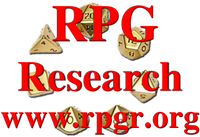Using Role-Playing Games in Recreation Therapy - Therapeutic Recreation Professional Panel Question
Question #7. Though decades of research in the psychiatric, psychological, sociological, and educational professions show significant benefits from participation in various forms of role-playing games (RPG) for many different populations, in both clinical and leisure settings, including especially with the tabletop and live-action variants, there does not appear to be any published research or programs in the TR industry utilizing these recreational activities in any form (tabletop, live-action (LARP), or computer-based). Do you have any thoughts or opinions as to why TR Specialists do not consider utilizing role-playing games in various forms as intervention modalities?
Considering the strong evidence of benefits indicated by decades of research in the psychological (Bay-Hintz, Peterson, & Quilitch, 1994), sociological (Fine, 1989, p. 319) and psychiatric (Blackmon, 1994, p. 624) professions, when considering different intervention modalities in the TR profession, when you hear the term RPG, as in role-playing game, what is your immediate reaction? How would you define the activity? Why do you think the TR industry does not appear to have anyone incorporating this activity into TR / RT program plans?
A number of studies have been published on a wide range of benefits from participation in tabletop and live-action RPG, but there is also research indicating therapeutic benefits from correctly applied computer-based games (Favelle, 1994, p. 151) (and many other more recent studies, though also caveats on overuse of computer-based RPG).
Especially significant to consideration for TR, is a key section from Stumbo (2009) regarding Avedon's 1974 intragroup interaction pattern:
Action of a cooperative nature by two or more persons intent upon reaching a mutual goal. Action requires positive verbal and nonverbal interaction... Learning how to cooperate and function successfully as a group member is a difficult task, but one that most clients need...Programming activities in this category is overwhelmingly important when we wish to assist clients in the development of positive and cooperative interactional skills... Many individuals feel that competitive activities are overemphasized in therapeutic recreation programs...Finding or creating good activities that utilize the intragroup pattern is a challenge... often difficult to establish a mutual goal that is attractive enough to the participants...the benefits resulting from successful participation in intragroup activities make the effort well worthwhile. (Stumbo, 2009, pp. 191-192)
Role-playing games, especially tabletop RPG, are exceedingly well-designed to meet this specific under-served need in the TR profession.
References
Bay-Hinitz, A. K., Peterson, R.F., & Quilitch, H.R. (1994, Fall). Cooperative Games: A Way to Modify Aggressive and Cooperative Behaviors in Young Children. Journal of Applied Behavior Analysis, 27(3), 433-446. Retrieved from http://www.ncbi.nlm.nih.gov/pmc/articles/PMC1297825/pdf/jaba00009-0017.pdf
Blackmon, Wayne D. (1994, Fall). Dungeons and Dragons: The use of a fantasy game in the psychotherapeutic treatment of a young adult. Journal of Psychotherapy, 48:4, 624-632.
Retrieved from http://rpgresearch.com/documents/other-projects-documents/1994-use-of-d-d- as-a-therapy-for-suicidal-schizoid
Fine, Gary Alan (1989). Mobilizing Fun: Provisioning Resources in Leisure Worlds. Sociology of Sport Journal, 6, 319-334.
Favelle, G. K. (1994). Therapeutic Applications of Commercially Available Computer Software. Computers in Human Services, 11 (1-2), 151-158.
Stumbo, N. J., & Peterson, C. A. (2009) Therapeutic Recreation Program Design. Fifth Edition. San Francisco, CA: Pearson.
Document Actions

